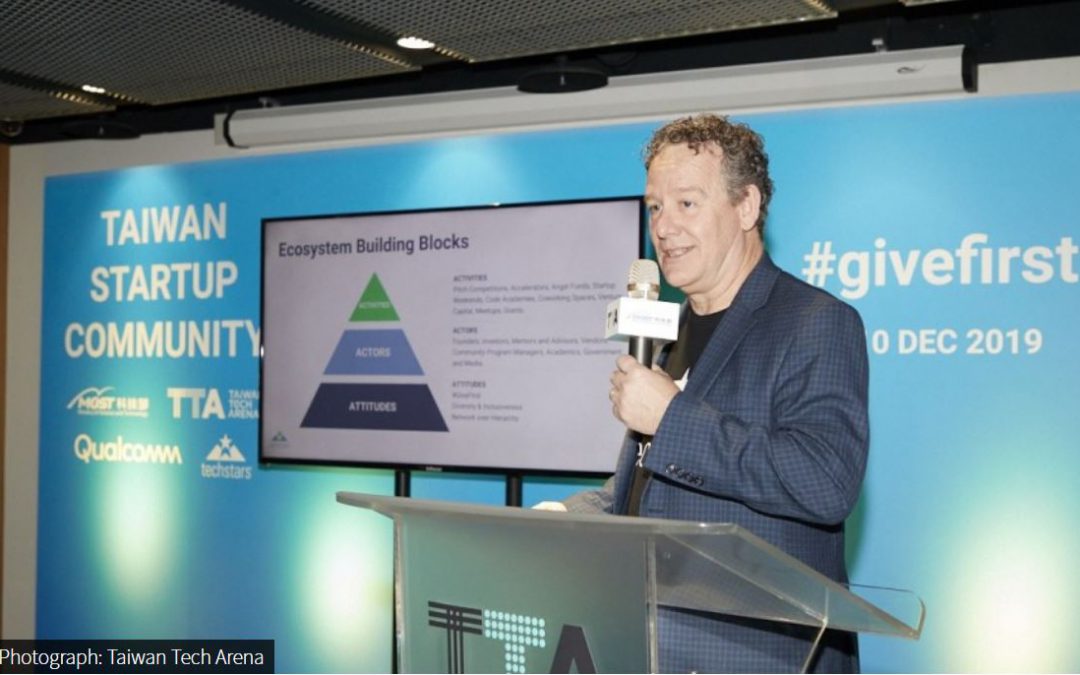A nudge to startup ecosystem: Techstars’ program in Taiwan, explained by VP Innovation Chris Heivly

Last year, Techstars has launched its first ever Startup Week in Taipei, Taiwan, and this year, while the same event was underway, the community leader brought another surprise to the city — to roll out a comprehensive program for startup ecosystem development in collaboration with Qualcomm and Taiwan Tech Arena (TTA), an incubator backed by the Ministry of Science and Technology (MOST).
Apparently, Taiwan “wants to do more,” to use Chris Heivly’s words. He’s the VP Innovation in the Techstars Startup Ecosystem Team and an experienced startup builder. He believes behind the ambition is the realization of “the gap between where the ecosystem is today and probably where it should be.”
As it matches the Techstars’ desire to expand its operations and grow footprint in Asia, the idea to collaborate with TTA has in fact been kindled a year ago. The program, different from the seed accelerator that the organization has been known for, focuses on strengthening the infrastructure of the entire startup ecosystem.
With multiple tools — including Startup Weekend, Hackathon, and one-on-one meetings — in hand, Techstars aims to develop a fully fledged ecosystem for founders and entrepreneurs in Taiwan, the first spot in Asia where all the tools will be leveraged.
Techstars will deploy these ecosystem-building tools, as in any other countries, based on a bottom-up approach. “We work with founders first and learn how to support founders,” Mr. Heivly said. “There’s an idea and a roadmap, but there isn’t a specific ‘do A, then B, then C, and then D.’” The program isn’t led by a single authority like the government.
Counterintuitive as it may seem to many, he said it’s the best way to build a startup community, as opposed to how the older generation comes to their success, that is, through mastering the idea of hierarchy and structure.
There seems to be no plan, but the direction is clear: to bind together all the actors in the ecosystem with a “founder-centric” attitude. They all can have a role to play in this program if they wish to create meaningful connections with startups and make them stronger, said Mr. Heivly.
His team seeks to facilitate engagement with universities, corporates (e.g., Qualcomm), and government (e.g., MOST and TTA) and pull them closer to the startup community through events and meetups.
Mr. Heivly took corporates for instance. As in most countries, they aren’t yet well connected with the startup community in Taiwan. But there’s great potential for them to collaborate with startups: they can help startups better understand a market and startups can help them drive internal innovation.
While his team’s impact cannot be quantifiably measured, the connectivity they create can be. An indicator may be, for instance, the number of people connected through events.
Instead of following the traditional framework in which an ecosystem is measured by how many jobs it creates or how much capital it deploys, they focus on understanding how the network is formed so as to learn how and why those numbers are achieved. This, he believes, will be the “foundational work” that helps the ecosystem grow better.
With its high-tech pedigree and large base of potential founders, the startup ecosystem in Taiwan can be even more vibrant, said Mr. Heivly.
Based on his observation and research, half of 1% of every given population are high-growth entrepreneurs, but there probably aren’t 115 thousand of them yet in Taiwan. “I want to bring them out,” he said.
While people tend to “culturally sit on the sidelines,” he believes they’re indeed pre-wired to start their venture — after all, he said, western thinking is embraced here. “I just need to nudge them a little bit.”
〔Original :Meet Startup @ TW〕
https://meet.bnext.com.tw/intl/articles/view/45874